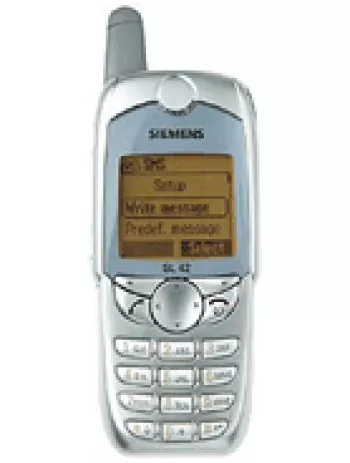
Introduction to Siemens S45
The Siemens S45, released in 2001, was a prominent feature phone from Siemens, known for its reliable performance and innovative features at the time. This device, part of the S series, stood out due to its compact build, efficient communication capabilities, and long-lasting battery life. It was a popular choice for users looking for a straightforward, reliable mobile phone.
Design and Build Quality
The Siemens S45 features a compact and ergonomic design, with dimensions of 109 x 46 x 20 mm and a weight of 93 grams. Its small form factor and lightweight construction made it convenient for users to carry around. The phone was available in two elegant color options: diamond silver and sapphire blue. The design was minimalistic, with a monochrome graphic display that could show up to seven lines of text.
Display
The display of the Siemens S45 was a monochrome graphic type, with a resolution of 101 x 80 pixels. While it may not have the vibrant colors and high resolution of modern smartphones, the display was adequate for the phone's primary functions, such as reading text messages and accessing the phonebook. The simplicity of the display contributed to better battery life, as it consumed less power compared to colored displays.
Network and Connectivity
The Siemens S45 supported GSM technology, operating on GSM 900 and 1800 bands. Despite the absence of 3G or 4G capabilities (common during its era), it provided reliable network connectivity for voice calls and basic messaging. The inclusion of GPRS Class 8 facilitated data connectivity, which was sufficient for WAP 1.2 browsing, giving users access to a simplified version of the internet.
Battery Life
Battery life was one of the standout features of the Siemens S45. It was equipped with a removable Li-Ion 850 mAh battery, which offered impressive endurance. The phone could last up to 300 hours on standby and provided up to 6 hours of talk time. This longevity was a significant advantage in an era when users prioritized battery life differently from today, due to lesser frequency of charging facilities.
Storage and Memory
The phone came with sufficient internal storage capacity for its time, but it did not support expandable storage via a card slot. It included a phonebook that could store up to 500 contacts, with each contact having up to 14 fields. The call records feature allowed users to track the last 10 dialed, 10 received, and 10 missed calls.
Sound and Alerts
The Siemens S45 supported monophonic ringtones, and users could download additional tones or compose their own. However, it did not include a loudspeaker or a 3.5mm audio jack, which limited its multimedia capabilities but aligned with the phone's primary use as a communication device.
Messaging and Communication Features
The primary form of communication on the Siemens S45 was SMS messaging. The lack of multimedia messaging (MMS) was consistent with feature phones of that time. The device included an infrared port, allowing for data transfer between compatible devices wirelessly, which was a significant feature for sharing contact details and other small files.
Additional Features
The S45 also came with a variety of other features that were considered advanced for its time, including an alarm clock, a few simple games, and the ability to support 20 different languages. Although it did not support modern Java applications, its simple feature set was both a limitation and a strength, providing a distraction-free communication tool.
Legacy and Impact
The Siemens S45 was more than just a communication device; it represented an era of early mobile technology where reliability and durability were paramount. Its enduring battery, basic internet functionality, and robust design made it a favorite among business users and those who preferred a no-nonsense phone. While modern smartphones have far surpassed the capabilities of the S45, this device remains a nostalgic symbol of early 2000s mobile innovation and simplicity in design and function.
Key Features of Siemens S45
- GSM Technology supporting GSM 900 / 1800 bands
- Compact Dimensions: 109 x 46 x 20 mm
- Lightweight: 93 g
- Monochrome graphic display with 101 x 80 pixels resolution
- Phonebook capacity of 500 entries with 14 fields each
- Infrared port for data exchange
- Comprehensive Messaging: SMS support
- WAP 1.2 browser for internet access
- Long battery life: Stand-by time up to 300 hours, Talk time up to 6 hours
- Available in two colors: Diamond Silver and Sapphire Blue
Disadvantages of Siemens S45
- Lacks support for EDGE network technology
- Monochrome graphic display with low resolution (101 x 80 pixels)
- No expandable memory slot (No card slot)
- Limited phonebook capacity of 500 entries
- Absence of a camera
- No loudspeaker or 3.5mm audio jack for headphones
- No WLAN, Bluetooth, or GPS connectivity
- Lacks radio functionality
- Does not support Java or advanced applications

View Also
More Phones
All Rights Reserved +14266 Phones © Mobilawy 2025

























